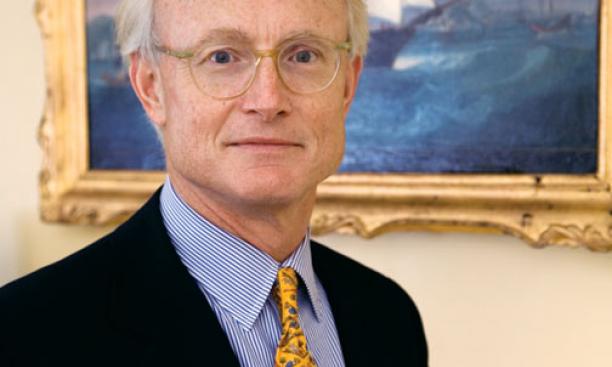

The Economist has called Michael Porter ’69 “the doyen of living management gurus.” A professor at Harvard Business School and strategic counselor to numerous heads of state (as well as a University trustee), Porter has written widely on America’s competitiveness in a global economy. He spoke with PAW in early March about problems facing the economy and the administration’s initiatives to address them.
You have written that America has become less economically competitive. When did the problem begin, and what are the causes?
The United States continues to have enormous competitive strengths, such as our entrepreneurial environment, our innovation culture, and our university system, and they have kept our economy performing well for the past 20 or 30 years. But we have neglected problems below the surface, and now they are starting to bite. One is the failure of our elementary- and secondary-education system. Americans who are retiring today are better educated than those just entering the workforce. Another problem is excessive and unnecessary costs of doing business here. Our health-care costs, energy costs, regulatory costs, and litigation costs are all very high. Our tax system is hugely cumbersome and inefficient. Businesses experience these costs and move jobs abroad. Another issue is that we started slowing our rate of investment in science and technology some time ago.
Is the current financial crisis undermining our competitive strength?
The underpinnings of our capital markets are very strong. If we make the needed regulatory changes, the U.S. will be able to restore its strengths. But right now our capital markets aren’t functioning, so solid companies have to cut back more than they otherwise would. Banks have to start normal lending again if the economy is to grow. Also, there are billions in private capital waiting on the sidelines. Part of the problem is that the government has been unpredictable, with shifting policies and rescue targets. Without clear rules, investors will wait.
You have blamed our political system for America’s competitiveness problems. Can you explain?
Thank God that most of what really matters in the United States doesn’t happen in Washington, but in the states and regions. The federal government has not been able to step up and tackle accepted problems it needs to address. Take litigation reform, which is a big cost and competitiveness problem facing many American companies. Here, parties repeat the same old false arguments, and can’t agree on steps that would benefit plaintiffs and defendants alike.
What do you think about the Obama administration’s stimulus and budget plans?
A lot of what the administration is proposing makes sense in light of the strategic challenges facing the country. The stimulus plan puts much focus on education, which is the root cause of inequality in America. The administration understands the need to rebuild our investment in science and technology and make the R&D tax credit permanent. I applaud the focus on energy issues. On the other hand, the proposal to limit charitable deductions is a really bad idea. And the administration is taking a big risk in raising taxes not just on income, but on savings and investment at a time when we desperately need more of both. I would keep these rates low, but lengthen the holding period to encourage the long-term investment we really need.
Some have criticized Obama’s plan for containing too many proposals that won’t stimulate the economy in the short term.
The challenge is to get the economy moving while also addressing the strategic issues facing the country. We should be doing things we need to do anyway, but more quickly. Money for college loans is a good example. This supports more students in college; it’s good for short-term jobs and spending but also key for competitiveness in the long term because college attainment has stalled in the United States and threatens our ability to sustain high wages. I am less confident about the heavy emphasis on infrastructure spending. This money will take a long time to be spent, and I am worried that it won’t go to the right projects because our system is not choosing infrastructure projects based on a rational analysis of economic impact. It’s political.
Are you concerned about the effects of huge federal deficits?
Yes. Moreover, a lot of the most important things that need to be done to boost competitiveness don’t take money. What the administration needs to do is change some of the rules about how we do business. We could reduce cumbersome regulations, reorganize the training system, and change the visa rules to allow foreign students who come here for college to remain in the United States after they graduate, all with the stroke of a pen. There are hundreds of such changes that would cost very little. However, this would require a rationality and sense of urgency to tackle problems that our government seems to have lost.
— Interview conducted and condensed by Mark F. Bernstein ’83
